The "Beautiful" Joint Effort to House Helene Survivors . . . At Least for Now
Nonprofits, businesses and governments have teamed up to secure campers and rentals as interim homes for displaced families. But the storm has made local long-term housing needs even more acute.
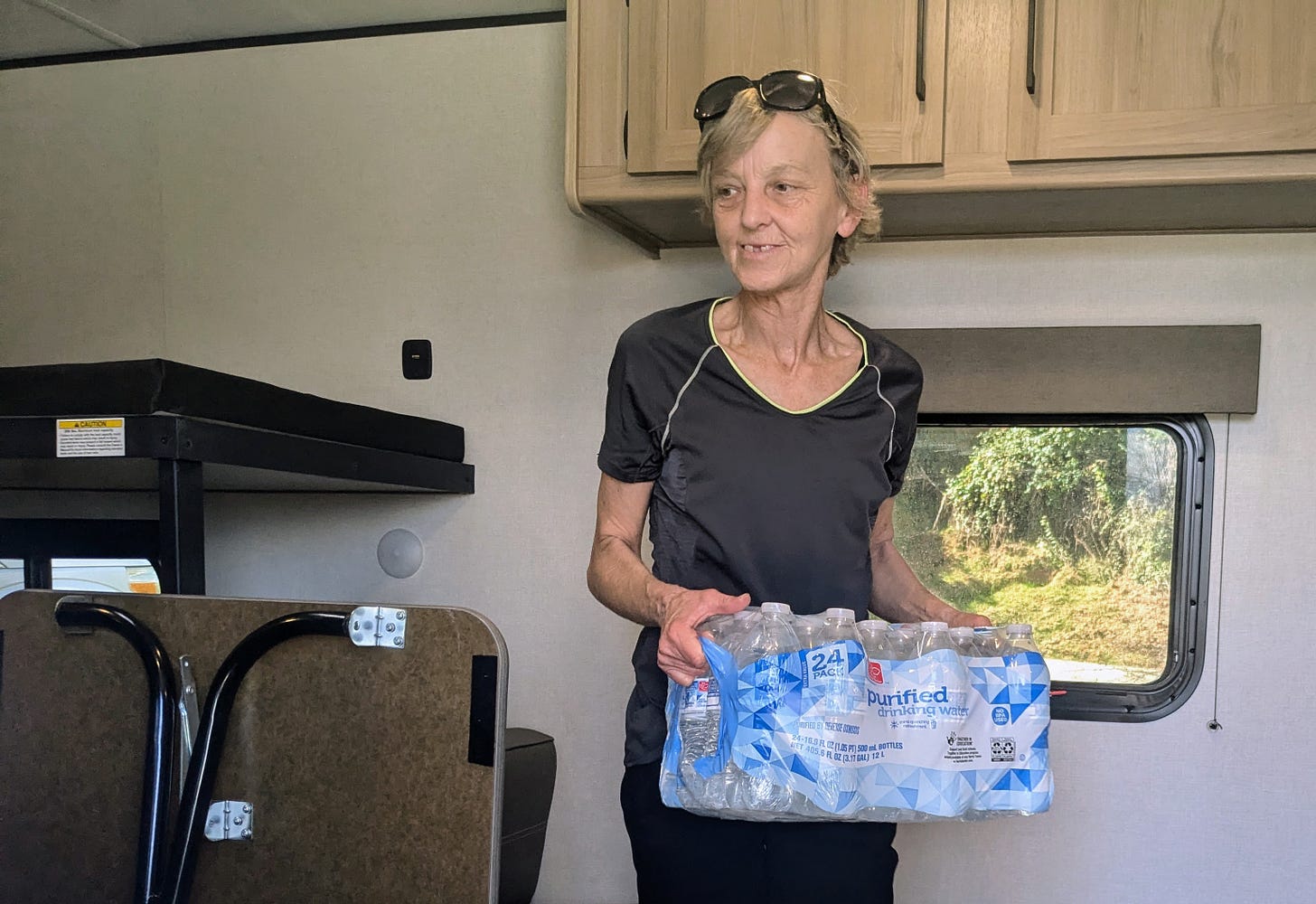
BREVARD — Freida Fisher’s general impression of the brand-new Coleman camper she moved into on Friday afternoon?
“Wonderful, wonderful, wonderful,” she said.
She bestowed an enthusiastic “awesome” upon each of the thoughtfully provided household items she unpacked — a blanket, a measuring cup, even a tube of toothpaste.
She implored bystanders to share her amazement at her new home’s built-in furnishings.
“Look at this bed!” she said of an expansive foam pad covered in gray vinyl. “My dogs can sleep right here with me.”
Fisher’s camper on Meadow Lane west of downtown Brevard was one of seven delivered last week by a Maiden, NC-based nonprofit, Operation Helo, to sites secured by Transylvania Habitat for Humanity.
It’s part of a joint effort by local governments, businesses and nonprofits that has provided interim housing to most of the 31 families the county recently identified as needing this assistance.
The work is allowing survivors of Tropical Storm Helene to take a crucial next step towards recovery, leaving emergency accommodations — hotel rooms, unheated cabins at the Brevard Music Center, and couches or spare beds in the homes of family members — for campers and rental units where they can stay for a year or more.
It is providing them with secure bases from which to make long-term plans. And it is giving them hope, Fisher said. “It’s like a new beginning after the storm.”
But both survivors and the groups coming to their aid pointed out that an even bigger challenge remains.
The county has so far identified 254 storm-damaged properties in Transylvania. Most of them are residences. Many are in need of repairs and/or foundation elevation that may take years to complete; some will be demolished.
And because the homes of workers and low-income residents tended to be the hardest hit, the county’s dire shortage of affordable housing has become even more crushing.
Addressing it will require locals to sustain the energy and teamwork they have demonstrated since Helene, including by pushing state and federal agencies to do more for affordable housing, said Brevard Mayor Maureen Copelof.
“We are raising this at the state level, that it's become even more critical to provide funding for housing projects — not just temporary housing — to solve this problem,” she said. “It’s not going to happen with the system we have right now.”
“A Real Outpouring”
Nonprofit efforts to find interim housing for displaced families have been understandably but frustratingly fragmented, said Yesica Miranda, who head up El Centro of Transylvania County, a nonprofit that serves Hispanic residents.
“I think everybody is overworked,” she said. “We’re just going, going, going. Everybody is trying to help but we're probably helping some of the same people.”
Because of this approach, and because many survivors have found temporary housing on their own, the county’s list likely undercounts the total number of families in need, representatives of nonprofits said.
But the bigger story about this phase of recovery is not fragmentation but cooperation, said Amy Fisher, the broker-in-charge of Fisher Realty, who has placed about a dozen storm survivors in rental properties.
There’s been better teamwork between the city of Brevard and Transylvania County than she’s seen in years, she said. And nonprofits, “instead of holding tightly to what they've got, are putting it all in the middle of the table and saying, ‘Here are the resources we collaboratively have, take what you need,’ ” she said.
“And that is beautiful.”
Amy Fisher, for example, has taken referrals of survivors from a variety of these groups and linked them with owners of available homes and apartments, including some previously used as vacation rentals and offered at reduced rates.
“My primary role has just been trying to be a community connector,” she said.
One of those nonprofits, Housing Assistance Corp. (HAC), has bought campers with the help of funds secured by the PLATT architectural firm’s post-storm initiative, PLATT HEAL.
It raised more than $300,000 in the wake of Helene, including about $150,000 in the first 24 hours of seeking donations, said the firm’s president, Parker Platt.
“We reached out to our associates and clients and had a remarkable, immediate response,” Platt said. “It’s been a real outpouring.”
HAC, as a registered nonprofit, is “basically receiving the donations we solicited,” he said.
The group has purchased eight family-sized campers at a discounted rate from Asheville’s Camping World, and this week will begin placing them on sites near Crab Creek Road provided by property owners John and Heather Blythe.
“They are purchasing the campers,” Platt said of HAC. “They are placing families in the campers and they are managing them.”
Besides the seven campers delivered by Operation Helo, Habitat secured a recreational vehicle donated by an individual, said Executive Director Angie Hunter, and placed another family in a Habitat home recently vacated because of foreclosure.
Her organization can offer other storm-related assistance thanks to more than $300,000 in contributions that have flowed in since the storm, she said.
Sharing House has an even larger pool of donated funds, a “huge influx” of nearly $500,000, said the group’s community impact director, Cara Bradshaw.
This will allow Sharing House to greatly expand the emergency assistance it offers families facing unexpected expenses.
In the past, this aid has been capped at $300 per year. But especially because many families are facing repair bills and mortgage payments on permanent homes along with the cost of interim housing, Bradshaw said, “we’re saying roughly $1,000 per family for hurricane relief.”
These payments can cover expenses such as utility bills, deposits on rentals and the replacement of flood-damaged appliances, she said.
Beyond this, she said, Sharing House has earmarked $100,000 of its storm funds to collaborate with other nonprofits.
“We consider that funding to be community money,” she said. “Obviously, we’ll be deploying it through Sharing House, but we’re also partnering with other organizations.”
FEMA Frustrations
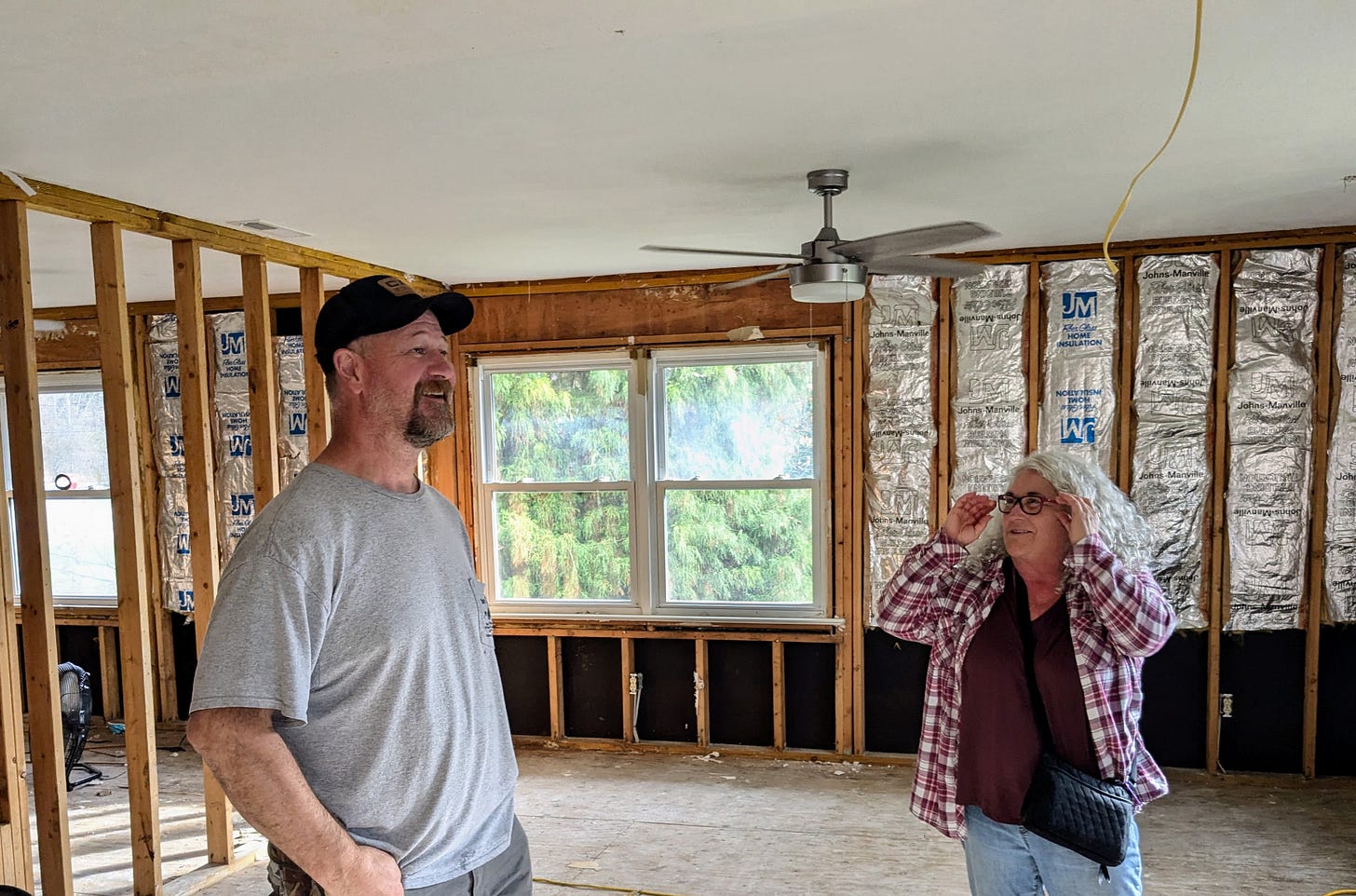
One of the county’s efforts will directly address the need for coordination between groups working to aid survivors.
County Administrator Jaime Laughter has secured a commitment from the state Division of Emergency Management to provide case workers in Transylvania, she said at Tuesday’s meeting.
The workers will not only help residents navigate the maze of options for aid from federal and state agencies, but create consolidated lists of residents in need and the resources available to assist them.
“It will keep us from duplicating services,” Hunter said.
Laughter also helped negotiate a doubling of the monthly amount FEMA provides to survivors for apartments and rental homes from about $1,150 to $2,300 for a two-bedroom unit.
Six families are currently receiving this assistance in Transylvania, she said, and the higher funding rate has expanded the pool of available properties by 11 units.
“At $1,100 you can’t get a house. It just doesn’t work,” Amy Fisher said. “But when you get up to $2,200, $2,300, and that’s for a two-bedroom, then you’re at market rate.”
Both the county and city have also enacted policies to help the hardest-hit families, the owners of the 61 “substantially damaged” properties in Brevard and Transylvania that lost more than half of their value in the storm.
If these structures are in established flood zones, FEMA may require their foundations to be raised above base flood elevation.
Both the city of Brevard and county have agreed to allow owners of these properties to make stopgap repairs so they can live in their homes for extended periods until this work is completed.
Laughter said Tuesday that the Emergency Management case workers are still being hired, but in the meantime representatives from the Division will be available next Tuesday, Wednesday and Thursday at the county’s Public Safety Center on Morris Road.
They will focus on grants that can buy back substantially damaged homes or pay to raise their foundations.
About which there is widespread confusion, according to both homeowners and people trying to assist them.
“I am hearing a lot of frustration and actually a lot of desperation” about FEMA assistance, Copelof said.
One issue is the language barrier, said Miranda, of El Centro. Many of the people her organization serves are Spanish speakers who lived in two hard-hit mobile home communities near Old Hendersonville Highway.
They have not been able to make FEMA representatives understand that, though they are not citizens, they are the parents of children born in the United States, which means their families can qualify for aid from the Agency.
“People are not getting what they need,” Miranda said. “The nonprofits are trying to help them, but eventually we’re going to run out of funds.”
Randy Ledford, whose home on Burnette Drive in Brevard was severely damaged by flooding, said residents in his neighborhood are also frustrated with FEMA.
The city, using a FEMA formula, has determined that the home where he lived with his wife, Donna, and her mother, is nearly 92 percent damaged, he said.
His $170,000 flood insurance policy, he said, will come far short of covering the cost of replacing lost possessions, raising the home and remodeling its interior, which has been stripped down to the studs.
“We all have the same story. We’ve all been denied for everything,” Ledford said, speaking above whirring dehumidifiers in his house and referring to his and his neighbors’ efforts to secure grants from FEMA.
“Basically, they say they don’t have any money.”
“A Blessing”
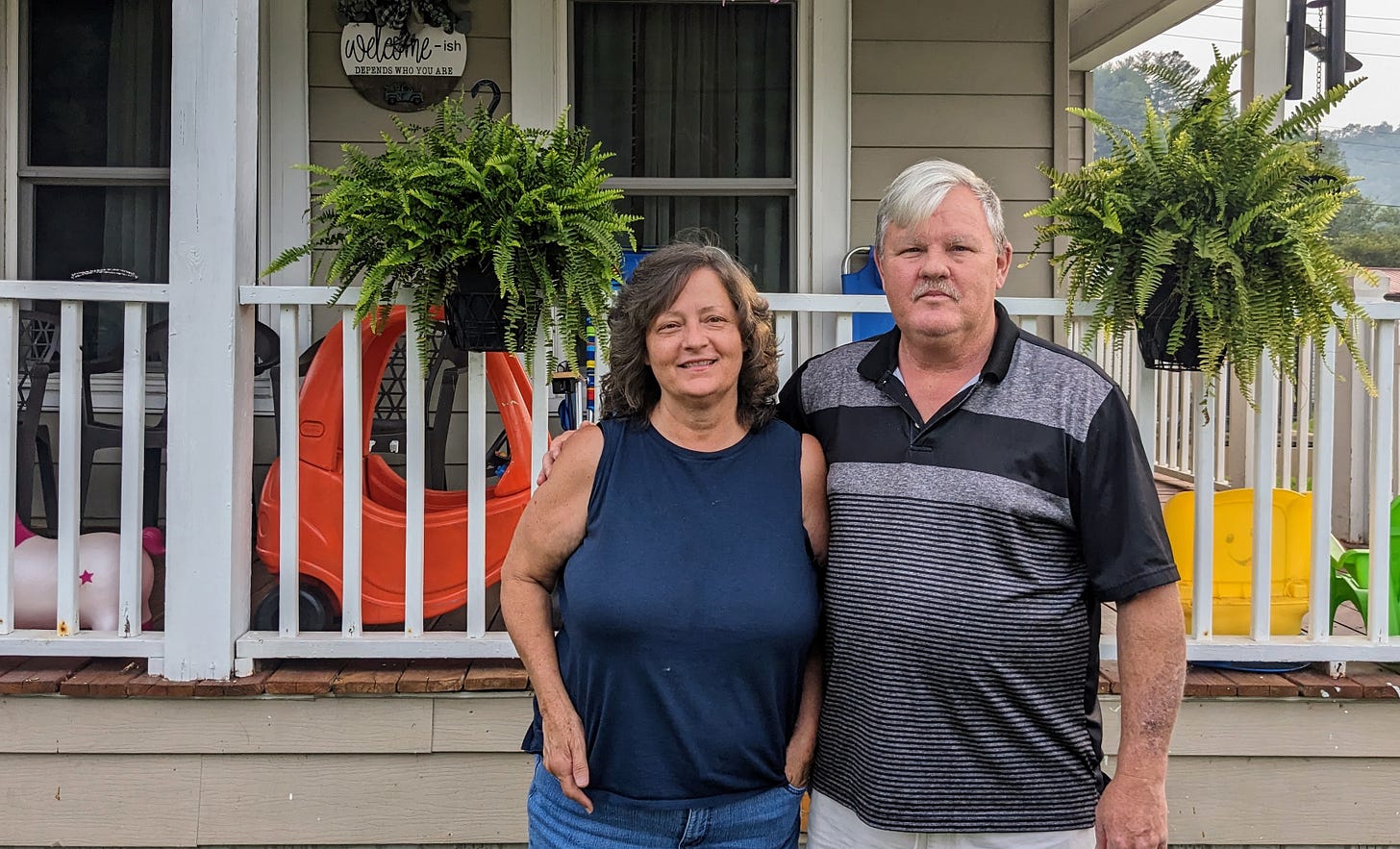
But FEMA has already distributed significant funds in Western North Carolina and more will be available, said Nicole Wilson, a public affairs specialist with the Agency.
It’s true that the Small Business Administration, which issues loans for rebuilding, “did recently announce they were out of funds,” she said, but federal lawmakers are expected to replenish its coffers in January.
She also provided a link to several programs that can “help a survivor rebuild, repair or replace their home and personal property,” she wrote in an email.
And with the help of FEMA’s Flood Mitigation Grants, North Carolina Emergency Management can cover the full expense of elevating homes.
“Hello! Did I say that you’re not going to have any out-of-pocket costs?” Kaine Riggan, an official with the Division said in an online informational video. Yes, he continued, “between a couple of different sources, this will all be covered.”
At least that’s true, he said, if the property is in a floodplain, is structurally sound, and “the project (is) both technically feasible and cost-effective at mitigating the risk of future flooding.”
The availability of grants varies according to the circumstances of the property and its owners, Wilson added, and “FEMA cannot determine how much assistance survivors might be eligible for until after the survivor has applied.”
But it worked out for Tim and Tina Pressley, whose home in Rosman was substantially damaged in flooding fueled by Tropical Storm Fred in 2021.
They received about $200,000 from Emergency Management to raise their home three feet. Though their yard and a utility shed were damaged in Helene, Tina Pressley said, their house remained high and dry.
The only additional requirement is that they maintain flood insurance on the home, she said, and a representative from Emergency Management recently contacted her to ask her to spread the word about the mitigation program.
“This is a blessing,” she said. “This is the best thing that could have ever happened to us.”
Long-Range Needs
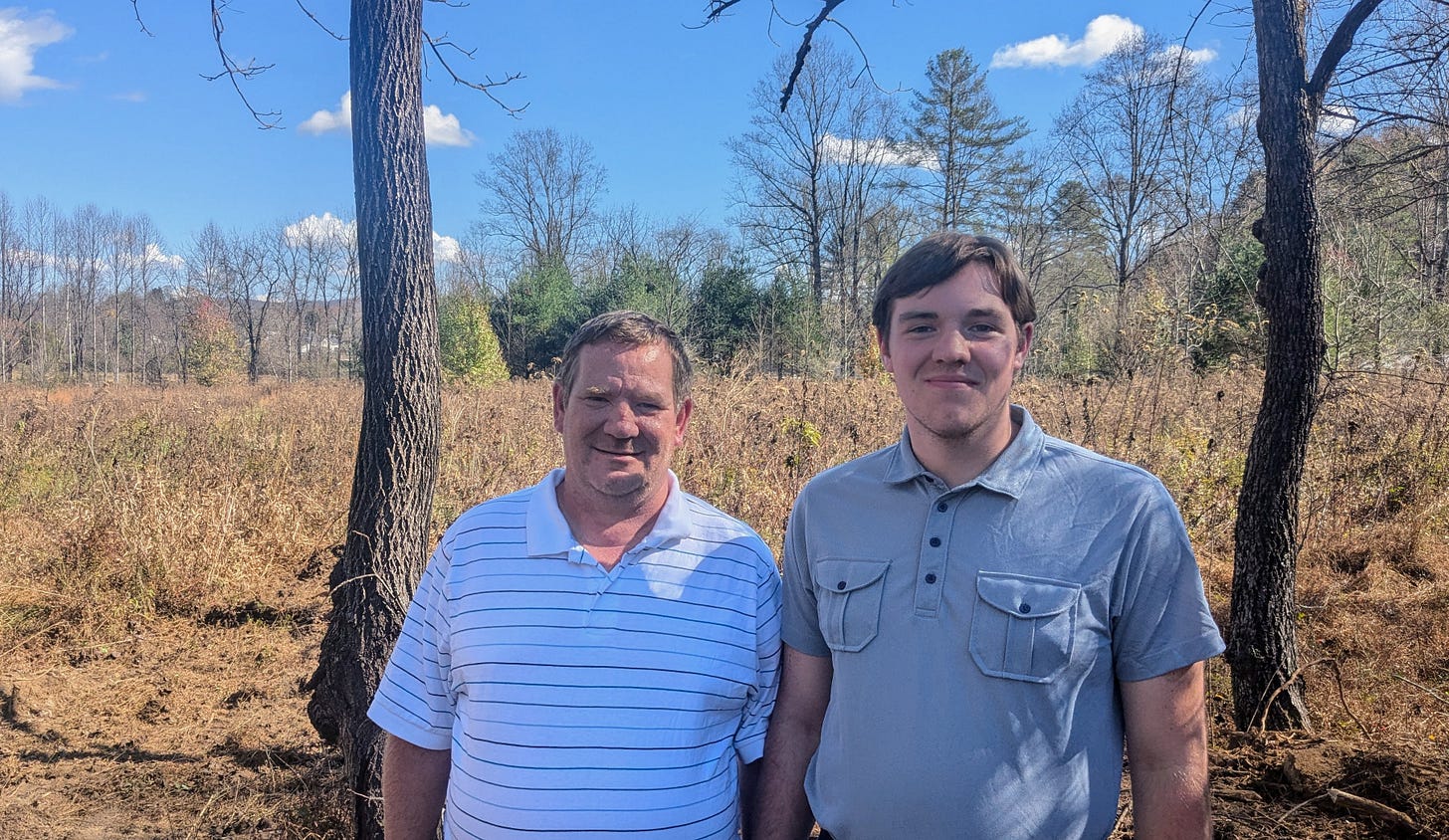
For perspective on both the pre-existing affordable housing challenges in Brevard and the additional obstacles created by Helene, Copelof pointed to the planned Fairhaven Meadow apartment complex.
This project, slated to be built on a parcel near Asheville Highway, was expected to create 42 new affordable rental units.
Now many of these apartments may be occupied by residents displaced by Helene.
That is, if Fairhaven can be completed. Construction of the project, the first one in the city to be approved for federal low-income tax credits in more than a decade, has been stalled by a funding gap of more than $1.5 million.
“We thought that would put us ahead,” Copelof said of Fairhaven, “but now it’s going to barely make up for what was lost in the storm. So the criticality of that project has really been upped in the city’s mind. You know, how do we help them move forward?”
Hunter, meanwhile, is holding on to the ever-diminishing hope that FEMA funds for temporary housing could eventually help her organization build the 49 residences it plans for its property on Meadow Lane.
The land is already served by a Brevard water line but needs access to wastewater treatment. She has proposed that the Agency extend these lines to allow the placement of up to 40 FEMA trailers on the site and, in the long run, serve the future Habitat homes.
But Hunter said she has been recently told that most of FEMA’s trailers will likely go to other counties in Western North Carolina and that extending utility lines to serve them is a “last resort.”
But the need for permanent housing is definitely there, said Freida Fisher, who has seen its shortage first hand.
Before the flood, she lived for three years in an apartment never fully repaired from the flood damage of Fred.
Since Helene, which inundated it with more than three feet of water, she has lived with her sister in Rosman. She hopes to eventually buy a Habitat home with her earnings as a restaurant server.
In the meantime, what she mostly feels is gratitude.
She is thankful for the “fantastic” work of Habitat in providing the camper, thankful she has been allowed to move in with her two small poodle-terrier mixed dogs, Phoenix and Max.
The property on Meadow Lane, bordered by woods and a field, is “beautiful,” she said, and she plans to make it prettier still by planting a flower bed outside her camper.
She is grateful for the emergency help offered by a church in the immediate aftermath of Helene, grateful for the money she received from FEMA to replace possessions.
And she’s never forgotten that, unlike the more than 100 people in the state who died in Helene, she has a chance to move past the storm, she said.
“We get to tell our story. A lot of folks in Western North Carolina won't ever get to tell their story, but we get to tell ours.”
Email: brevardnewsbeat@gmail.com




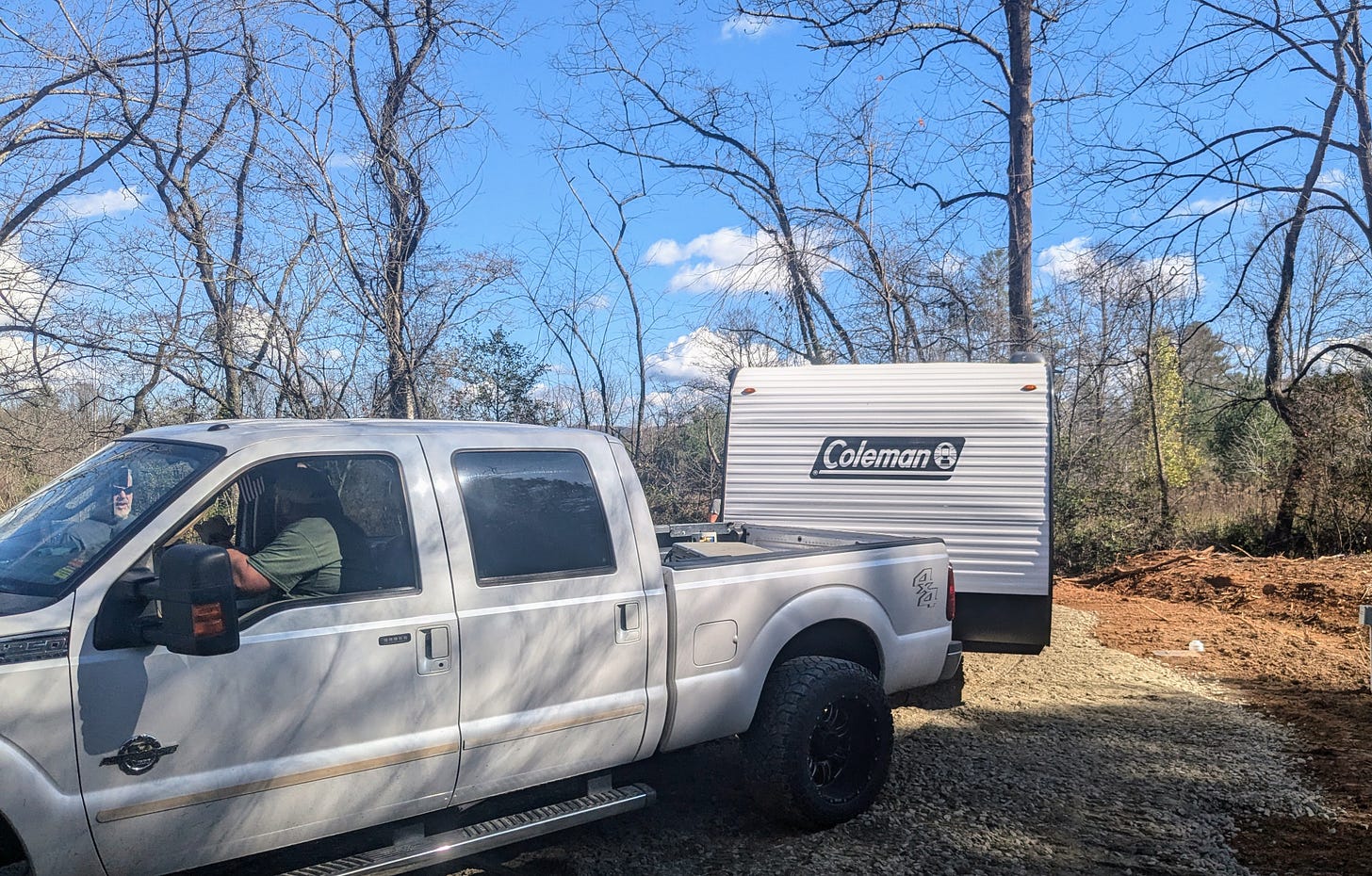
Incredible work by so many!
Thank you for an informative article.
What terrific collaboration after such a tough time here. With no blueprint, the folks mentioned in this story and more behind the scenes, worked so hard to find housing as quickly as possible. Dan, thank you for covering this important, beautiful story.